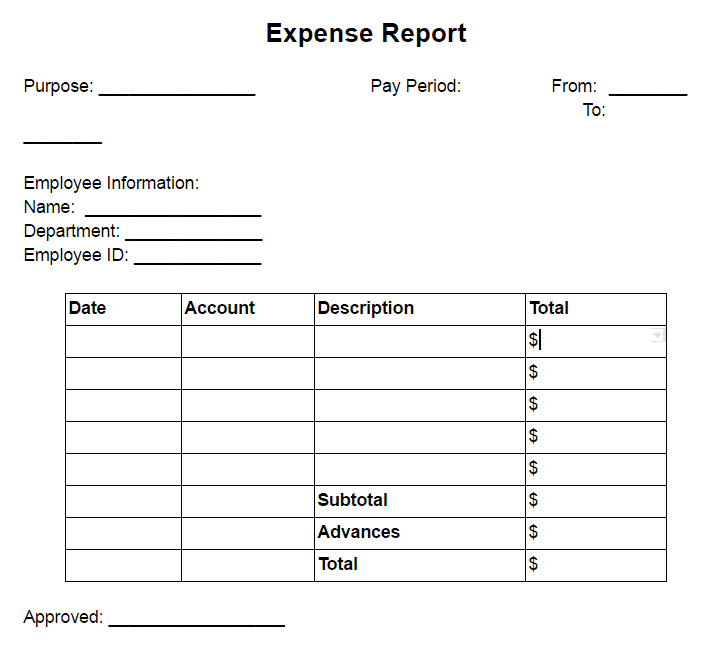If you have employees, expense reporting is an important part of your accounting process. Expense reports allow flexibility and make it easier for employees to do their jobs. To save your business time and money, create an expenditure report policy.
What is an expense report?
Expense reports are used to track purchases that employees make for your business. Once the employee makes the purchase, they should fill out a business expense report and submit it to you. Common business costs on an expense report include:
- Travel expenses
- Supplies and tools
- Entertainment and meals for clients
Employees are not responsible for paying your business costs out-of-pocket. When an employee makes a business purchase, like business related travel and entertainment, pay a reimbursement or give an advance.
With a reimbursement, the employee uses their money to make the purchase, and you pay them back. With an advance, you give the employee money. Then, they make the purchase. The advance is subtracted from the purchase amount on the expense report.
Purchases made on expense reports are business expenses, not a part of payroll. Are reimbursed expenses taxable? You do not withhold or pay employment taxes on an employee reimbursement. You pay the amount of the reimbursement to the employee and record it as a business expense in your accounting books.
There is no standard way to fill out a business expense report. You can customize the report to fit your business’s needs. But, you should include the following information for accurate small business expense tracking and reimbursements:
- Date the purchase was made
- Nature of expense (the items that were bought)
- Amount of the purchase
- Itemized expenses (how much individual items cost)
- Subtraction of advances
- Total amount of reimbursement
You can provide a form or template for employees to submit. Employees might fill out an expense summary on paper or online.
Expense report template
Using a standard form makes reimbursements easier for you and your employees. Try this expense report example for your small business.

Setting up an expense report policy
To stay accurate and compliant, create a business expense report policy. Employees should follow procedures in the policy when requesting reimbursements. The policy should include the following information:
- Expense guidelines
- Time frame
- Pre-approval
- Supporting documents
Make reimbursements easy for employees and yourself. A complicated system wastes time and depletes productivity at your business. Avoid headaches and errors with a simple, streamlined expense reporting process. Include the following sections in your policy.
Expense guidelines
Expense guidelines map out what purchases you will and will not reimburse. And, it explains the situations where an employee reimbursement is necessary.
The expense guidelines section gives a clear picture of what qualifies for reimbursement. For example, you might require employees to choose the cheapest travel option. Or, you could say you will not reimburse employees for alcoholic beverages.
You don’t need to list out every item that employees can and cannot get reimbursed for. But, you should include major limitations and details about what you’re willing to repay.
Time frame
The time frame shows how soon employees need to submit expense reports. And, it explains how soon you will reimburse employees after they submit reports.
For an effective reimbursement process, keep expense reporting moving. The faster you receive the reports, the healthier your small business cash flow. And, employees want to be reimbursed quickly. Include reasonable timelines in your policy to make sure everyone is on the same page.
Pre-approval
For large expenses, have employees request your approval before they purchase items. That way, you can monitor reimbursements and make sure employees don’t overspend. For example, you might want to approve the amount of a plane ticket since they are generally expensive. Have employees attach approvals to their expense reports.
Supporting documents
For a successful expense reporting system, good records are key. Employees should keep supporting documents for purchases, such as business receipts and invoices. Have them write notes on receipts, like their name and the reason for the expense or job number. When an employee submits an expenditure report, they should attach supporting documents to it.
Need a simple way to record your business expenses? Patriot’s online accounting software is easy-to-use and made for the non-accountant. We offer free, U.S.-based support. Try it for free today.
